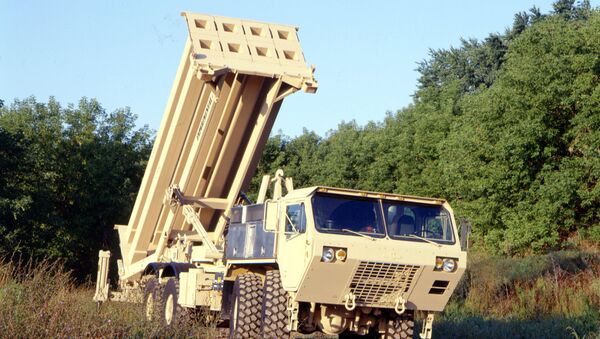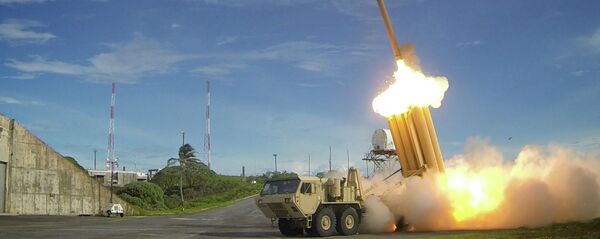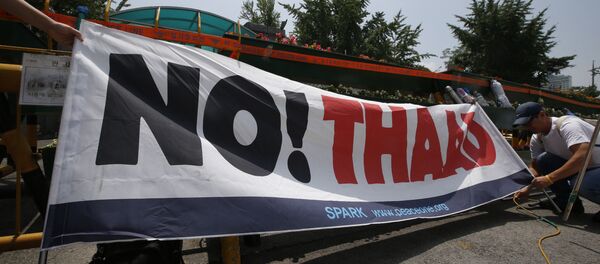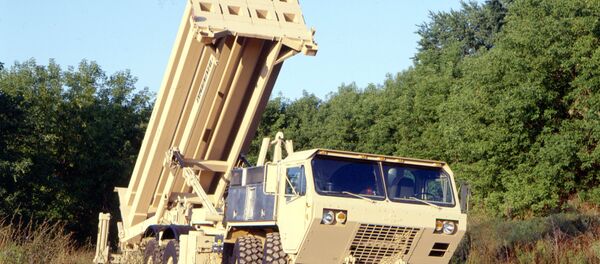The bolstering of the alliance between the US, South Korea and Japan would leave no room for a strategic dialogue between Seoul and Beijing, Professor Kim Jaecheol of the Catholic University of Korea warns.
On February 27, Xinhua reported that Lotte Group, a South Korean conglomerate, offered its golf course to be used as a site for Terminal High Altitude Area Defense (THAAD).
"The signing is forecast to speed up the remaining procedures for the THAAD deployment in South Korean soil," the media outlet highlighted.
The THAAD deployment in South Korea remains an apple of discord for Beijing and Seoul.
"Because of the THAAD deployment, a contention of will between Beijing and Seoul has emerged and retreat doesn't seem to be an option right now for either side. Given this, China might as well take any necessary actions and let South Korea bear the punishments which it once fancied it might be able to duck," the Global Times wrote Tuesday, calling upon Beijing to bring an end to Lotte Group's development in the Chinese market.
Both Moscow and Beijing have repeatedly signaled that they see the THAAD deployment in South Korea as inappropriate and possibly affecting other countries' interests.
"The deployment of THAAD in South Korea marks a new round of strategic games between China, Russia and the US," the Global Times emphasized, dubbing the recent developments "a mighty blow against strategic mutual trust between Beijing and Seoul."
For its part, Seoul continues to assure Beijing that the installation will be aimed at countering North Korea's missile threat.
"We will maintain our principle that the decision for the THAAD installation is a sovereign and self-defense act aimed at protecting the country and its people from North Korea's nuclear and missile threats," Foreign Ministry spokesman Cho June-hyuck said Tuesday, as quoted by Yonhap.
However, according to Kim, there is more to Seoul's decision than meets the eye.
Kim recalled that it was former South Korean president Lee Myung-bak who announced his intention to create a trilateral US-Korean-Japanese alliance a few years ago.
"China's doubts began to emerge when the former president of South Korea, Lee Myung-bak, signaled his intention to form a regional trilateral alliance between the US, South Korea and Japan," the academic told Sputnik Korean, adding that now Beijing's doubts have reached their apogee.
Kim expressed skepticism over Seoul's ability to ease tensions with Beijing.
Last year Beijing accused South Korea's president Park Geun-hye of violating previous agreements with the Chinese to coordinate Seoul's initiative to deploy missile defenses with China.
"Both sides have completely different views on this issue," Kim believes, "Instead of negotiating [the matter], they have nearly engaged themselves in a fist fight over the missile defense issue."
Still, Kim thinks that Beijing may raise this question during upcoming talks with Washington.
"In return for their joining the sanctions against North Korea, Beijing may offer Washington to reconsider its decision to deploy the missile defense system in South Korea," he said.
Reuters reported that Yang Jiechi met US President Donald Trump and held talks with his senior advisers at the White House on Monday.
According to South China Morning Post, Yang was visiting Washington "to lay the groundwork for a meeting between Chinese President Xi Jinping and his US counterpart Donald Trump that could come as early as May."
Kim suggested that Beijing will try to reach an agreement with the US on the THAAD deployment and then use this deal to impose pressure on Seoul.
"The Ministry of Defense and the National Security Agency of [South] Korea are in a hurry to deploy the missile defense system because they believe that under the next government the situation may change," Kim noted.
In any event, by bolstering the development of the US-Korean-Japanese trilateral alliance, Seoul risks deepening the rift with Beijing, the academic stressed.




